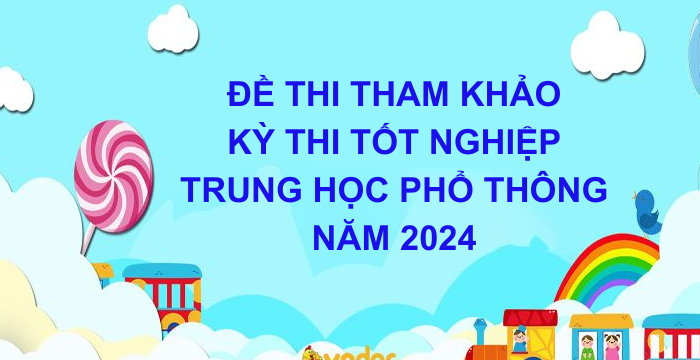Đề Thi Thử Tốt Nghiệp THPT Năm 2024 (22.05.2024) Đề 11
Thầy Thắng
ĐỀ THI THPT
15
Ngày đăng: 22-05-2024 10:33:38

ĐỀ 11 ĐỀ THAM KHẢO PHÁT TRIỂN MINH HỌA BGD 2024
KỲ THI TỐT NGHIỆP TRUNG HỌC PHỔ THÔNG NĂM 2024
Bài thi: NGOẠI NGỮ; Môn thi: TIẾNG ANH
Thời gian làm bài: 60 phút không kể thời gian phát đề
Mark the letter A, B, C, or D to indicate the word whose underlined part differs from the other three in pronunciation in each of the following questions.
Question 1. A. homemaker B. clothes C. close D. bond
Question 2. A. teach B. teenager C. connection D. appreciate
Mark the letter A, B, C, or D to indicate the word that differs from the other three in the position of the primary stress in each of the following questions.
Question 3. A. express B. depend C. discuss D. struggle
Question 4. A. solution B. principal C. passenger D. continent
Read the following passage and mark the letter A, B, C, or D on your answer sheet to indicate the correct answer to each of the questions.
Revenge Bedtime Procrastination
“Revenge bedtime procrastination” is a term that describes the decision to sacrifice sleep for leisure activities, (5) __________ this is driven by a daily schedule that lacks free time. For people in high-stress jobs that take up the (6) __________ of their day, revenge bedtime procrastination is a way to find a few hours of entertainment even though it results in insufficient sleep.
Sleep procrastination can take several different forms. One form involves delaying the act of getting into bed (bedtime procrastination), while (7) ___________ is more about delaying the time of trying to fall asleep once in bed (while-in-bed procrastination). The English term “revenge bedtime procrastination” emerged from a translation of an expression in Chinese that (8) ___________ frustration caused by long, stressful working hours that left little time for personal enjoyment. In this way, bedtime procrastination is seen as a way to get “revenge” on daytime hours for people (9)________ have little or no free time.
(Adapted from sleepfoundation.org)
Question 5: A. so B. and C. or D. but
Question 6: A. pile B. bulk C. mass D. heap
Question 7: A. another B. others C. other D. the other
Question 8: A. relieved B. revealed C. released D. reflected
Question 9: A. who B. what C. that D. which
Mark the letter A, B, C or D to indicate the correct answer to each of the following questions.
Question 10. The children __________ that school receive a good education.
A. who attends B. attending C. attended D. have attending
Question 11: I think spring is _________ season of the year.
A. beautiful B. very beautiful C. more beautiful D. the most beautiful
Question 12. I will send you some postcards, ______.
A. until I will arrive at the destination B. as soon as I arrive at the destination
C. when I arrived at the destination D. after I had arrived at the destination
Question 13. The Iphone 14 Pro Max is very popular _____ young adults because of its notable features.
A. with B. on C. for D. about
Question 14. The flowers in our school garden are very beautiful, _______?
A. aren’t we B. is it C. isn’t he D. aren’t they
Question 15. The concert is expected to attract a lot of audience, so you should book _______ tickets in advance.
A. a B. an C. the D. x
Question 16. Oprah Winfrey has been an important role model for black American women, breaking down many invisible _______.
A. barriers B. trends C. gaps D. races
Question 17. I am thinking of changing my current job because I can’t _______ my low salary.
A. live on B. pay out C. save up D. set out
Question 18 If you’ve finished ________ the dictionary, I’d like to borrow it.
A. to have used B. to use C. using D. having used
Question 19. The ceremony will be boring, but I suggest you still __________ in an appearance.
A. bring B. place C. set D. put
Question 20. When she came home from school yesterday, her mother _______in the kitchen.
A. cooked B. was cooking C. is cooking D. cooks
Question 21. He only receives a ________ salary every month, but it allowed him to make ends meet.
A. simple B. modest C. humble D. lowly
Question 22: “What a beautiful shirt you’re wearing!” “Thank you. It ________ especially for me by my mother last week.”
A. is made B. has made C. made D. was made
Question 23. For a public campaign to_______, it is important to make use of existing social organizations as well as other relations.
A. successful B. success C. succeed D. successfully
Question 24. Don’t make a(n) ______ of going to bed late, Yumi. It’s only going to harm you.
A. custom B. habit C. pattern D. routine
Read the following passage and mark the letter A, B, C, or D on your answer sheet to indicate the correct answer to each of the questions.
As we explore outer space, we are also been creating a bit of a mess. Orbiting our planet are thousands of dead satellites, along with bits of machinery from all the rockets we’ve launched over the years. And one day, these objects that we leave in space – which are called space debris or space junk – could pose serious issues.
All space junk are man-made objects launched from Earth, which remain in orbit until they re-enter the atmosphere. Some objects in lower orbits of a few hundred kilometres often re-enter the atmosphere quite fast and then burn up before reaching the ground. But junk and dead satellites that are left at higher altitudes of 36,000 kilometres, can continue to circle Earth for hundreds or even thousands of years.
Even the smallest pieces of space junk can travel at speeds up to 28,000 kilometres per hour, presenting great risks to satellites functioning around the Earth. As a result of this, they have to actively move out of the way to avoid getting hit. In total, across all satellites, hundreds of collision avoidance manoeuvres are performed every year, including by the International Space Station (ISS), where astronauts live. Fortunately, collisions scarcely happen and when they do, there has been no serious loss.
The United Nations have called for the removal of satellites from orbit, and several companies around the world have come up with creative solutions, including removing dead satellites from orbit and dragging them back into the atmosphere, where they will burn up. However, these methods are only useful for large satellites orbiting Earth. For now, we can only wait for smaller pieces of debris to naturally re-enter Earth’s atmosphere.
(Adapted from nhm.ac.uk/discover)
Question 25: What is the passage mainly about?
A. Benefits of keeping outer space clean B. How satellites avoid hitting space junk
C. The problem of space debris D. Innovative ways to clean up space
Question 26: In paragraph 2, what do we learn about space debris or space junk?
A. Most space debris are created and sent into space by humans.
B. Space junk at lower altitudes usually returns to Earth quickly.
C. A lot of space debris burn up as they go near the Earth’s atmosphere.
D. When satellites are dead, they circle the Earth for thousands of years.
Question 27: The word “They” in paragraph 3 refers to ___________.
A. pieces B. speeds C. risks D. satellites
Question 28: The word “scarcely” in paragraph 3 is closest in meaning to __________.
A. slightly B. rarely C. faintly D. roughly
Question 29: Which of the following is TRUE, according the passage?
A. Dead satellites are the most common type of space junk.
B. The bigger a piece of space debris is, the faster it can travel.
C. The ISS help satellites avoid collisions hundreds of times yearly.
D. There is currently no method to remove smaller space junk from orbit.
Mark the letter A, B, C, or D to indicate the sentence that best completes each of the following exchanges.
Question 30. John was in Hanoi and wanted to send a parcel to his parents. He asked a local passer-by the way to the post-office.
- John: “Can you show me the way to the nearest post office, please?” - Passer-by: “______”
A. Look it up in a dictionary! B. Just round the corner over there.
C. There’s no traffic near here. D. No way! I hate him.
Question 31. Mrs Brown and Mr Smith are talking about teaching soft skills at school.
- Mrs Brown: “Some soft skills should be taught to children.”
- Mr Smith: “______. They are necessary for them.”
A. I don’t either B. I agree with you C. You’re quite wrong D. You’re welcome
Mark the letter A, B, C or D to indicate the word(s) OPPOSITE in meaning to the underlined word(s) in each of the following questions.
Question 32. In this writing test, candidates will not be penalized for minor mechanical mistakes.
A. punished B. rewarded C. motivated D. discouraged
Question 33. John has been unemployed for the past three years – he’s really in dire straits.
A. in a serious situation B. in a bad situation
C. in a difficult situation D. in a pleasant situation
Mark the letter A, B, C or D to indicate the word(s) CLOSEST in meaning to the underlined word(s) in each of the following questions.
Question 34. My neighbor is a reckless driver. He has been fined for speeding this month.
A. enormous B. cautious C. careless D. famous
Question 35. Young couple got divorced after they realized that they were not compatible.
A. able to share an apartment or house B. able to budget their money
C. capable of living harmoniously D. capable of having children
Mark the letter A, B, C, or D to indicate the sentence that is closest in meaning to each of the following questions.
Question 36. Every student is required to write an essay on the topic of lifelong learning.
A. Every student might write an essay on the topic of lifelong learning.
B. Every student must write an essay on the topic of lifelong learning
C. Every student can’t write an essay on the topic of lifelong learning.
D. Every student needn’t write an essay on the topic of lifelong learning.
Question 37. He last cooked for the whole family five months ago.
A. He didn’t cook for the whole family five months ago.
B. He has cooked for the whole family for five months.
C. He hasn’t cooked for the whole family for five months.
D. He would cook for the whole family in five months.
Question 38. “How long have you been working as a journalist?” She asked him.
A. She asked him how long he has been working as a journalist.
B. She asked him how long has he been working as a journalist.
C. She asked him how long he had been working as a journalist
D. She asked him how long had he been working as a journalist.
Mark the letter A, B, C or D to indicate the underlined part that needs correction in each of the following questions.
Question 39. The company had better develop more rapid and reliant systems for handling customers’ complaints.
A. company B. rapid C. reliant D. complaints
Question 40. My brother leaves his job last week because he did not have any chance to travel.
A. leaves B. because C. did not have D. to travel
Question 41. Commercial airliners do not fly in the vicinity of volcanic eruptions because even a small amount of volcanic ash can damage its engines.
A. do not fly B. vicinity C. because D. its
Read the following passage and mark the letter A, B, C, or D on your answer sheet to indicate the correct answer to each of the questions
When 37-year-old Heather Marcoux was expecting her son several years ago, she and her husband assumed he would be the first of many. But today, the parents are very clear that the young boy will never have a sibling. “We can offer our one child a pretty good standard of living,” she says. “But if we added any more kids, it would go down significantly.”
It’s easy to see why young people are hesitating to have large families. Financial stability is more difficult to achieve than ever. One in 10 non-retired Americans say their finances may never recover from the COVID pandemic. For many, home ownership is nothing but a wild dream. In Marcoux’s case, having to pay increasing living expenses and maintaining a home are part of the reasons why the family won’t have more children. It’s scary, she says, to think that something catastrophic could happen and throw them into financial crisis in the uncertain future. On top of that, adds Marcoux, she worries that she isn’t providing enough for her son.
For other would-be parents, these financial concerns are only compounded by worries over political and civil unrest, both local and global. While wars and political issues have been a reality for nearly every generation, parents today face a world that seems much scarier than that of their own parents or grandparents. Despite higher-than-ever life expectancy, improved technology and access to modern healthcare, the constant presence of the mass media everywhere means we’re much more aware of all the terrifying things happening around the world, from food shortages to school shootings.
The ongoing climate crisis is also a factor. A 2019 poll by Business Insider showed close to a third of Americans thought couples should “consider the negative effects of climate change when deciding whether to have children”. Marcoux says she fears the next generation will suffer with the worst effects of climate change, and she worries about the dismal version of the Earth her child and potential grandchildren will inherit. “Why would I bring another child into the mix when I sometimes think about the future and am just terrified for him or her?” This is also the question many young people have as they decide how many children to have, or whether to have any at all, in the face of increasingly desperate reports about the state of the planet.
(Adapted from bbc.com)
Question 42: Which best serves as the title for the passage?
A. Is The World Really As Bad As Parents Think It Is?
B. Why Parents Are Worrying About Their Children’s Future
C. Parenthood Is Becoming Scarier Than Ever In Today’s World
D. The Financial Challenge Facing The Next Generation Of Parents
Question 43: Why does Marcoux no longer want to have more children?
A. She is already struggling to maintain a good standard of living.
B. She may never recover financially after the COVID pandemic.
C. She believes that a catastrophic event will soon take place.
D. She is concerned about how much she is providing her son.
Question 44: The word “them” in paragraph 2 refers to __________.
A. expenses B. reasons C. children D. family
Question 45: The word “compounded” in paragraph 3 is closest in meaning to ___________.
A. exaggerated B. dramatized C. intensified D. emphasised
Question 46: Which of the following is NOT TRUE, according to the passage?
A. 10 percent of Americans say their finances will never return to pre-COVID levels.
B. Owning a house has become something that is entirely impossible for many people.
C. The mass media heightened our awareness of horrifying things happening globally.
D. Marcoux is worried about the future, which deters her from having more children.
Question 47: The word “dismal” in paragraph 4 can be best replaced by ___________.
A. flat B. blunt C. dim D. sour
Question 48: Which of the following can most likely be inferred from the passage?
A. Future generations will no longer understand the values of having children.
B. In the past, people around the world were less alarmed by negative issues.
C. Conflicts and political issues around the world can never come to an end.
D. Most young people will not have children until the climate crisis is over.
Mark the letter A, B, C, or D to indicate the sentence that best combines each pair of sentences in the following questions.
Question 49. She is snowed under with work. She cannot go out with her friends at weekend.
A. If she weren’t snowed under with work, she could go out with her friends at weekend.
B. Provided that she is snowed under with work, she cannot go out with her friends at weekend.
C. She wishes she were snowed under with work, she could go out with her friends at weekend.
D. If she were snowed under with work, she couldn’t go out with her friends at weekend.
Question 50. Ngoc’s personal information was leaked. She was aware of the danger of the Internet.
A. No sooner had Ngoc realised that the Internet was dangerous than her personal information was leaked.
B. Only after Ngoc’s personal information had been leaked did she realise how dangerous the Internet was.
C. Not until Ngoc’s personal information had been leaked was she aware of the benefit of the Internet.
D. Hardly had Ngoc’s personal information been leaked when she realised how beneficial the Internet was.
THE END
Giải đáp mọi thắc mắc trong đề - mua bản word và đáp án vui lòng liên hệ Zalo: 034 8371 758
Theo dõi fanpage để cập nhật nhanh các bài tập và đề kiểm tra mới nhất.
https://www.facebook.com/profile.php?id=61555984765050
Bài Viết Liên Quan

Đề Thi Thử Tốt Nghiệp THPT 2025 (27.05.2025)

Đề Thi Thử Tốt Nghiệp THPT 2025 (03.04.2025)

Đề Thi Thử Tốt Nghiệp THPT 2025 (02.04.2025)

Đề Thi Tốt Nghiệp THPT Năm 2024

Đề Thi Thử Tốt Nghiệp THPT Năm 2024 (29.05.2024) Đề 19

Đề Thi Thử Tốt Nghiệp THPT Năm 2024 (28.05.2024) Đề 18

Đề Thi Thử Tốt Nghiệp THPT Năm 2024 (27.05.2024) Đề 17

Đề Thi Thử Tốt Nghiệp THPT Năm 2024 (25.05.2024) Đề 16

Đề Thi Thử Tốt Nghiệp THPT Năm 2024 (24.05.2024) Đề 15

Đề Thi Thử Tốt Nghiệp THPT Năm 2024 (24.05.2024) Đề 14

Đề Thi Thử Tốt Nghiệp THPT Năm 2024 (23.05.2024) Đề 13

Đề Thi Thử Tốt Nghiệp THPT Năm 2024 (23.05.2024) Đề 12

Đề Thi Thử Tốt Nghiệp THPT Năm 2024 (22.05.2024) Đề 10

Đề Thi Thử Tốt Nghiệp THPT Năm 2024 (20.05.2024) Đề 9

Đề Thi Thử Tốt Nghiệp THPT Năm 2024 (20.05.2024) Đề 8

Đề Thi Thử Tốt Nghiệp THPT Năm 2024 (17.05.2024) Đề 7

Đề Thi Thử Tốt Nghiệp THPT Năm 2024 (16.05.2024) Đề 6

Đề Thi Thử Tốt Nghiệp THPT Năm 2024 (15.05.2024) Đề 5

Đề Thi Thử Tốt Nghiệp THPT Năm 2024 (09.05.2024) Đề 4

Đề Thi Thử Tốt Nghiệp THPT Năm 2024 (08.05.2024) Đề 3

Đề Thi Thử Tốt Nghiệp THPT Năm 2024 (05.05.2024) Đề 2

Đề Thi Thử Tốt Nghiệp THPT Năm 2024 (03.05.2024) Đề 1

Đề Thi Thử Tốt Nghiệp THPT Năm 2024 (09.04.2024)

ĐỀ THI THAM KHẢO KỲ THI TỐT NGHIỆP TRUNG HỌC PHỔ THÔNG NĂM 2023 (05.04.2024)

Đề Thi Thử Tốt Nghiệp THPT Năm 2024 (05.04.2024)

Đề Thi Thử Tốt Nghiệp THPT Năm 2024 (1.04.2024)

Đề Thi Thử Tốt Nghiệp THPT Năm 2024 (1.04.2024)

ĐỀ THI THAM KHẢO KỲ THI TỐT NGHIỆP TRUNG HỌC PHỔ THÔNG NĂM 2024 (22.03.2024)

Đề Thi Thử Tốt Nghiệp THPT Năm 2024 (15.03.2024)

Bài Đăng Gần Đây

Đề Kiểm Tra Giữa Kì 2 Tiếng Anh Lớp 7 Global Success (3.2.2026)

Đề Kiểm Tra Cuối Kì 1 Tiếng Anh Lớp 10 Global Success (02.01.2026)

Đề Cương Ôn Tập Cuối Học Kì 1 Tiếng Anh Lớp 8 Global Success (30.12.2025)

Đề Kiểm Tra Cuối Kì 1 Tiếng Anh Lớp 6 Global Success (30.12.2025)

